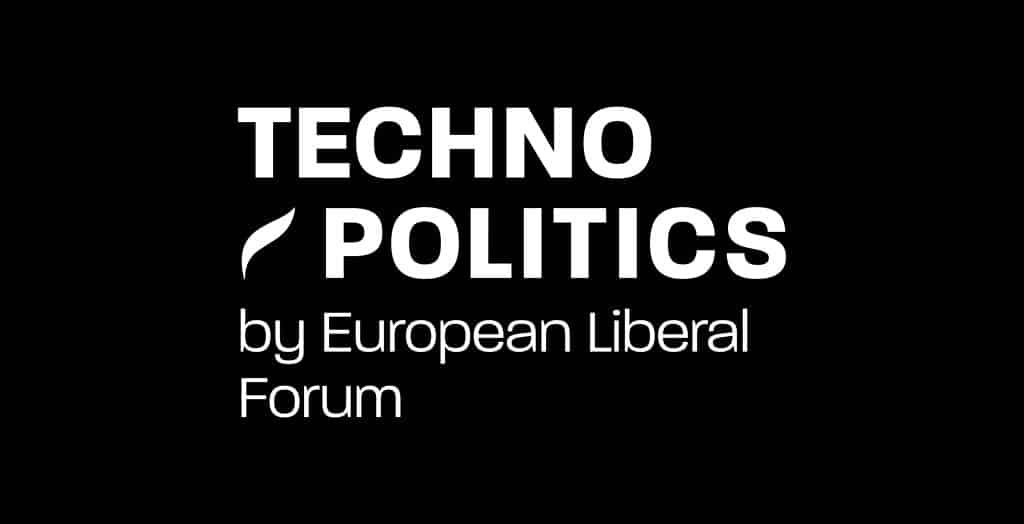Techno-Politics
TechnoPolitics vs Europe series aims to gather experts, industry representatives, academics and politicians to discuss how new and future technologies can influence traditional ‘policymaking’.

TechnoPolitics vs Europe series aims to gather experts, industry representatives, academics and politicians to discuss how new and future technologies can influence traditional ‘policymaking’.

New technologies have added value to civilisation, improving and even lengthening our lives. Already new technologies are shaping the way we live and new technologies are appearing before our eyes as more effective methods of communication are invented, tested, and implemented.
Europe is at a critical juncture: on the one hand, the digital transition offers unprecedented opportunities. On the other hand, this must be supported by intelligent policy choices.
TechnoPolitics by the European Liberal Forum creates a bridge between tech industry, academia, and policymakers. It represents an important step towards this new future-oriented way of thinking that considers policymaking as a tool to create a link between technology and the individual and to support our digital future.
Join us for the fourth edition of the Techno-Politics Forum, a full-day event exploring the intersection of technology, democracy, and strategic autonomy in Europe. From the environmental cost of green tech to the governance of AI and Europe’s place in the digital geopolitical race, this forum dives deep into the policy, ethics, and innovation shaping our digital future.
Expect interactive debates, documentary insights, future-focused panels, and plenty of opportunities to engage. The day concludes with a networking Techno Apero.
12:00 – 12:30 Registration and welcome coffee
12:30 – 13:30 Book L(a)unch “Behind Batteries: The Hidden Cost of Green Mobility”
Organised with: Inditsuk Be Magyarországot (IBM) Foundation
12:30–13:15 – Book presentation over lunch
Speakers: MEP Karin Karlsbro, Renew Europe Group
Anna Vindics, Policy expert and Editor
Polyàk Palma, Author and Senior Researcher, Max-Planck Institute
13:30 – 14:00 Opening remarks
Speaker: MEP Jan-Christoph Oetjen, President, European Liberal Forum
14:00 – 14:20 Keynote speech on Diffusion of Technology in Europe
Dr. Jeffrey Ding, Researcher on AI & Global Order, Microsoft
14:20 – 14:40 Grand Ideas Session: Pitch Your Best Idea!
Moderator: Maartje Schulz, Policy and Research Manager, European Liberal Forum
14:40– 14:50 Mini Coffee Break
14:50 – 15:35 Panel I – Governing Algorithms: Democracy and Trust in the AI Era
How can democracies ensure transparency, fairness, and accountability in algorithmic governance?
Moderator: Ana Vasconcelos Martins, MEP, Renew Europe
Speakers:
Cynthia Ní Mhurchú, MEP, Renew Europe
Dr. Stefan Buijsman, Associate Professor Responsible AI, TU Delft
Christian Nasulea, Executive Director at IES-Europe
Laura Lazaro Cabrera, Counsel and Director of the Equity and Data Programme, Centre for Democracy & Technology Europe
15:35 – 15:45 Keynote Speech on The Future of Technology in Europe and beyond
Speaker: Audrey Scozzaro Ferrazzini, Vice-President Government Affairs, Qualcomm
15:45 – 16:30 Panel II – The Rise of (Tech) Sovereignty and Geopolitics: Can Europe Compete?
Moderator: Francesco Cappelletti, Cybersecurity researcher at VUB and senior fellow at ELF
Speakers:
Davio Larnout, CEO, Superlinear
Audrey Scozzaro Ferrazzini, Vice-President Government Affairs, Qualcomm
Julia Ebert, Head of Vodafone Institute, Vodafone
Raluca Csernatoni PhD, Fellow, Carnegie Europe
16:30 – 16:45 Coffee Break
16:45 – 17:30 Interactive Open Dialogue – What Kind of Tech Future Do We Want?
A fireside chat format with audience engagement (empty chair)
Moderator: Ailbhe Finn, Executive Director, European Liberal Forum
Speakers:
Freeke Heijman, Governmental Affairs Office at Qblox and Vice-President at QuIC
Tiit Terik, Member of Tallin City council, Former Estonian Minister of Culture and Deputy-Mayor of Tallin
17:30 – 18:15 Panel III – A Liberal Tech Agenda (2025–2030)
Moderator: Javier Espinoza, Journalist, Capital Forum
Speakers:
Simona Popa, Vice President, Government Affairs, InterDigital
Jorgo Chatzimarkakis, CEO, Hydrogen Europe
Dr. Antonios Nestoras, Founding Director of EPIC and ELF Senior Fellow
Paulo Trezentos, CEO, co-founder at Aptoide, Vice President Iniciativa Liberal
18:15 – 18:20 Closing remarks
Ailbhe Finn, Executive Director, European Liberal Forum
18:20 – 21:00 TechnoApero
21:00 End of the Event
Publications
Techno-Politics Series 1 – Decoding EU Digital Strategic Autonomy: Sectors, Issues, and Partners
Edited by Gerard Pogorel, Antonios Nestoras, Francesco Cappelletti
This study, published by the European Liberal Forum and edited by Emeritus Professor Gerard Pogorel, Antonios Nestoras and Francesco Cappelletti, addresses a range of key concerns and opportunities associated with developing the EU’s strategic digital autonomy, from research and education to strategic deployment of resources.
Techno-Politics Series 2 – Europe’s Future Connected: Policies and Challenges for 5G and 6G Networks
Edited by Erik Bohlin, Francesco Cappelletti
This study, edited by Professor Erik Bohlin and Francesco Cappelletti, focuses on these and other essential aspects, such as the most appropriate policies and regulations in Europe, while at the same time offering a perspective on the world’s significant pioneers in the deployment of this technology.
Techno-Politics Series 3 – European Cybersecurity in Context: A Policy-Oriented Comparative Analysis
Edited by Luigi Martino and Nada Gamal
This study, edited by Professor Luigi Martino and Nada Gamal, approaches the topic from a multidisciplinary point of view, considering critical infrastructures, skills, strategic autonomy, AI, cybercrime, privacy, and the use of space. Starting from an EU perspective, the authors examine the regulatory achievements in this field and consider best practice for the implementation of rules and standards.
Techno-Politics Series 4 – Smart Parliaments: Data-Driven Democracy
Edited by Fotios Fitsilis and George Mikros
Smart Parliaments: Data-Driven Democracy highlights the role of data within both centuries-old and relatively novel institutional functions such as legislative work and parliamentary diplomacy. It is precisely this balanced focus on both tradition and innovation that makes this work stand out. Moreover, the book systematically avoids a purely scholarly character for the sake of a more practical and tangible approach to parliamentary evolution. It offers ideas instead of assumptions, solutions instead of missals, and presents a range of options instead of a single truth.